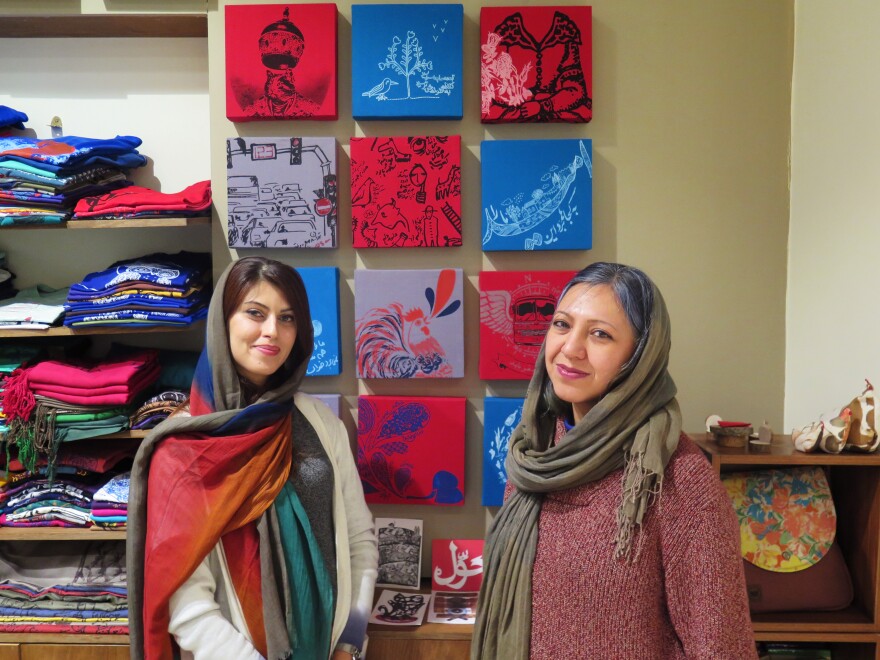Last year, an Iranian economist named Mohammad Mehdi Behkish was extremely optimistic about prospects for a nuclear deal that would end many economic sanctions on his country.
"Personally, I would say it can't be that there would not be a deal," he told me when I met him in Tehran.
The alternative, he said, was disaster.
Behkish leads Iran's International Chamber of Commerce. When I met him again this month in his Tehran office, he sounded even more optimistic.
"We are actually in a new world," he said. "I think everything is going to change. Everything. Many things."
Under the nuclear deal, which took effect last month, Iran's markets will open to new goods and investment. His country could even do more business with the United States, where Behkish was educated decades ago.
But this economist is being careful to speak in the future tense.
The deal is done. The work is not.
Scores of foreign business groups have come to Iran, but few are putting down money.
"Those who want to invest in Iran, to my understanding, are now very limited," he said. Very limited, even though the opportunities seem huge. Iran has a young and growing population of more than 75 million. It's the highly educated populace of an oil-rich republic.
You can see the scale of the opportunity just by driving in Tehran, where it seems as if most people could use a new car.
International businesses see something else.

"They are afraid or concerned," Behkish said. "They should be concerned."
Powerful Iranian government institutions have become economic players. A military force, Iran's Revolutionary Guard Corps, controls a huge construction conglomerate and other assets. Businesses have also been under pressure from sanctions, which they developed a habit of avoiding.
"You know, the worst thing sanctions did to Iran," Behkish says, was leading businesses to "learn noncompliance. And that became, unfortunately, a kind of habit. So if that becomes a tradition for you, [it] is very bad."
On Transparency International's map of the world ranking global corruption in 2015, the darker the color of the country, the more corrupt it is. Iran is dark — as dark as Russia. The best you can say is that it's brighter than Afghanistan.
"Now we have to come back," Behkish says. "And to come back, globalization will help us a lot."
He's hoping Iran will make more international agreements, such as joining the World Trade Organization. In other words, he's hoping that higher standards can be imposed from outside — which means Iranians may have to wait to see improvement.
This includes two women who've already waited a long time.
Sara Noghani and Pooya Shahsiah run a clothing store in Tehran. We found them dressed as stylishly as they were a year ago. Noghani wore a headscarf in pink, orange, red and blue. Beneath Shahsiah's headscarf, we glimpsed her dyed blue hair.
Their store, Tehran Collage, is still the same bright spot in a shopping mall.
"About the business, it's not — nothing has changed. I can tell [you] that it is worse than last year," Noghani said.
I asked if the store was at least making money.
"That's a joke," she said, laughing. "That's a joke. No, it's not."
As we stood there, a customer did make a purchase, pulling a clock off the wall. It's been hanging there for years, Noghani said, and now somebody wants to buy it.
Shahsiah and Noghani design some of their own products — shirts and scarves and jewelry. They don't like to talk about politics, which can be hazardous in Iran. But they do talk about their designs. And Shahsiah says the themes of her designs suggest her views.
One year ago, designs in this shop played on the themes of hope or omid — a new dawn.
Today, it would seem, the dawn has come — but their latest design was a little hard to work out.
They'd planned a theme of exploration, Shahsiah said — traveling the world. But on reflection, it seemed better for their art to suggest dreaming. A slogan on a shirt says, "Close your eyes and come."
At this moment, she said, they're just imagining things rather than practicing.
Shahsiah and Noghani are deciding how much longer they can stand to dream. Noghani now has an option. Long ago, she spent time in Australia and discovered she could apply for residency there.
"It's the great chance that I have; I don't want to lose it," she said.
Some of her relatives urged her to move there. But the application for residency takes years.
"So I decided to come back to Iran and start my business and do whatever I wanted to do in Australia, do it in Iran," she said. "Because it's more appreciated — not more appreciated, more in need, I think."
Finally — just as the possibility of better times began to emerge in Iran — her Australian residency came through. So now she has to choose.
She is deciding how much longer she can wait to feel Iran change.
She held up a single finger.
One more year.
Copyright 2020 NPR. To see more, visit https://www.npr.org. 9(MDAwMzY5MzE4MDEzMTE3ODg5NDA4ZjRiNg004))



